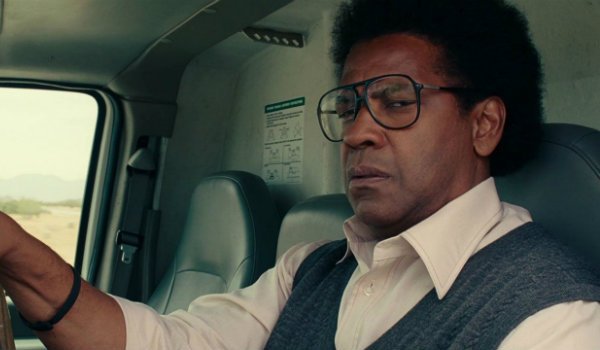How long can we fight the good fight before the good fight takes its toll? What are disadvantaged people supposed to do in a world that feels tailor-made to keep them down? Those are questions posed by Dan Gilroy's ethical thriller Roman J. Israel, Esq., and while it is a legitimately good film that allows Denzel Washington to turn in a fantastic lead performance, it's also incredibly uneven and doesn't quite stick the landing when its two central stories draw to a close.
We open in the midst of a scathing legal brief, and then ever so slightly pull out to the world of a wood-lined legal office. This is the comfort zone of Roman Israel (Denzel Washington), an old-fashioned law savant with no people skills but a deep-seated passion for using his brain to fight for justice. However, when a medical emergency befalls his partner -- very much the face of the firm -- Roman finds himself caught jobless, in-between the fancy law firm of cynical legal hotshot George Pierce (Colin Farrell), and Maya Alston (Carmen Ejogo), a young revolutionary who grows to see value in Roman's way of doing things. This situation puts his near-supernatural knack for legal ethics in a vice grip and forces him to confront the possibility that he may have to compromise his values in the name of self-preservation.
At its core, Roman J. Israel, Esq. is a story about the potential death of idealism in modern America. In many ways, it feels like an attempt to tell a tale akin to Mr. Smith Goes to Washington or To Kill A Mockingbird, but through a very 2017 lens. However, unlike those stories, there's an undercurrent of contemporary cynicism that plagues the world of Roman Israel. The titular character feels like a man stuck out of time (his best years were the 1960s and 1970s) and he slowly but surely begins to question whether or not his lifelong crusade in the name of justice has even been worth it. As he progresses, we watch a man with big ideas come to lament the fact that the world we live in may be unchangeable.
These ideas can get a bit heavy-handed at times (like the titular character, the film doesn't excel at subtlety), but more often than not, the film is generally successful at conveying the horrifying societal injustices that Roman sees befalling his middle to lower class clients. The film maintains a powerful, ripped-from-the-headlines sensibility, and that's when it works best.
Despite those big ideas, it is impossible to shake the feeling that Roman J. Israel, Esq. plays out like two entirely different movies that don't necessarily play off of each other as well as the film thinks they do. On the one hand, the movie has quite a bit to say about the state of the American prison system, certain inherent flaws that exist in the criminal justice system, and the notion of the prison industrial complex. On the other hand, Roman J. Israel also devotes quite a bit of its time to Roman's journey down the moral and ethical rabbit hole as he finds himself forced to exist in the legal spotlight for the first time in years.
On their own, each of these storylines would be enough to sustain a full movie. One is a story about unwavering idealism in the face of a less-than-forgiving system, while the other is a tale of struggle in the face of personal adversity. These ideas mesh at various points throughout the run of the movie, but it never really feels like either one substantively feeds into the other, and by extension, the film feels like it could've been shorter AND more in-depth by focusing on one of them.
In the hands of a less capable actor, a character like Roman Israel could really fall flat. His quirks have a tendency to border on cartoonish at times, and his abrasiveness does often make him come off as incredibly unlikable. However, Denzel Washington imbues the character with such a distinct sense of sadness and naivety that it is almost impossible not to root for him -- even when he offers up an antiquated opinion on a social situation that defies the modern sense of political correctness. As Israel, Washington exudes moments of pure joy and utter sadness that legitimately pull on your heartstrings, and it's hard not to imagine that Washington's name will once again be thrown around (even if the movie isn't) when the next award season gets rolling.
With that said, the impact that Roman Israel has on the other people in his life doesn't necessarily ring true by the time the film's curtain lowers. The arcs of characters like George Pierce and Maya Alston feel rushed, which ultimately makes them weaker foils for the film's lead character. When viewed as a whole, it is hard not to shake the feeling that the film would've been better off dropping one of them in favor of a deeper focus on the other. In that regard, I find myself personally drawn more to Farrell's character, as he undergoes the second-biggest transformation in the film -- second only to Roman himself.
Roman J. Israel, Esq. is two great movies that make a good one. It is anchored by big ideas and a wonderful performance, but stories A and B never mesh into something profound. The tale is a good one (and one worth telling, at that) but it ultimately fails to rise to the ranks of the profoundly iconic legal dramas that it's aspiring towards.
Originally from Connecticut, Conner grew up in San Diego and graduated from Chapman University in 2014. He now lives in Los Angeles working in and around the entertainment industry and can mostly be found binging horror movies and chugging coffee.












